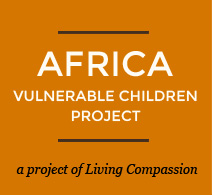It is impossible to communicate the fullness of our days in Ndola. Each day is filled with new sights, endless possibility. And yet, Saturday stands out as extraordinary. It began with a trip to Kantolomba to meet with the community to respond to their fourteen-point proposal and to discuss how to work together to meet the goals.
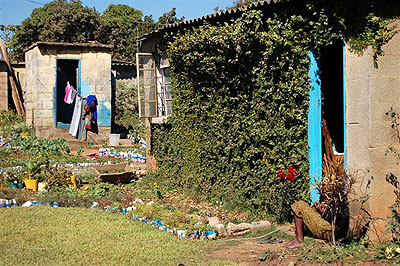
Garden on the way to Kantolomba.
The day before in our meeting with the Mayor he suggested we involve the Councilor for Kantolomba in our vision and projects. He explained that every compound has a representative in city government called the Area Representative. Mrs. Mukeya (yes, finally a woman leader!) is not only the representative for Kantolomba, she is the first ever female Chairperson for the entire Ndola City Council. The Mayor gave us her number and we arranged to meet her the next day at the school in Kantolomba.
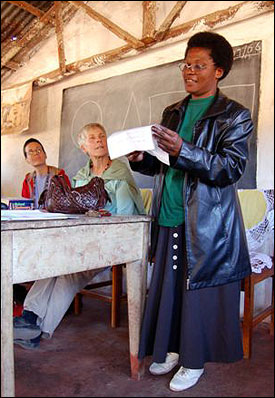
Mrs. Mukeya’s speech
As we arrived at the schoolhouse we were once again greeted with an outrageous welcome that included enthusiastic singing and lively dancing. Mr. Kayula (a true gift and resource for Living Compassion in Africa. He is gentle, kind, gracious, knowledgeable, and seems to know everyone in Zambia!), translated as we heard the community members speak and as we expressed our willingness and commitment to assist.
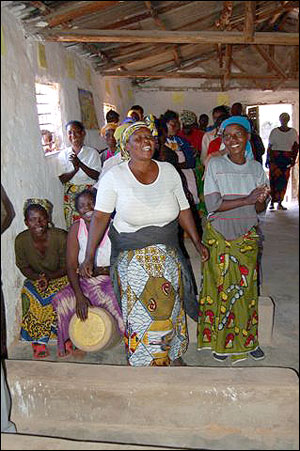
Welcoming us to the school
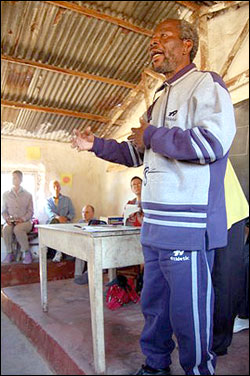
Mr. Kayula translating
Together we laid out a plan to begin work on Wednesday. The folks in Kantolomba will measure the windows, doors, fencing area, water pipe distances and so forth for a shopping list. Tuesday we will buy the materials; work will begin on Wednesday and continue through Saturday. For those of you who have been with us on a work retreat you know how excited we are to put on our overalls and get started. At times like this we are very grateful for our lifestyle—we know how to put in water pipe, we are well-trained carpenters, we enjoy painting. Let’s face it, we love to work.
We will take plenty of before and after pictures.
After the meeting we walked with Theresa Kapenda up the hill to the top of Kantolomba. We had a perfect view of the valley below. We commented to Theresa that the countryside is so beautiful and she agreed adding that it is a shame that it is filled with such poor dwellings, so much garbage, and such dire life circumstances. Both are true: Amidst the indescribable poverty and need we saw great beauty (in people and land), ingenuity, courage, and resourcefulness.
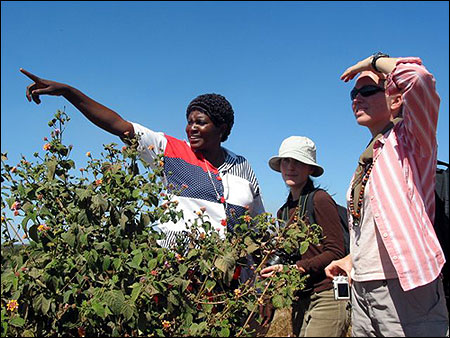
Theresa showing us Kantolomba
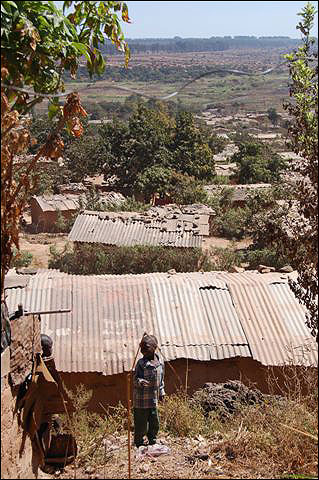
View across rooftops
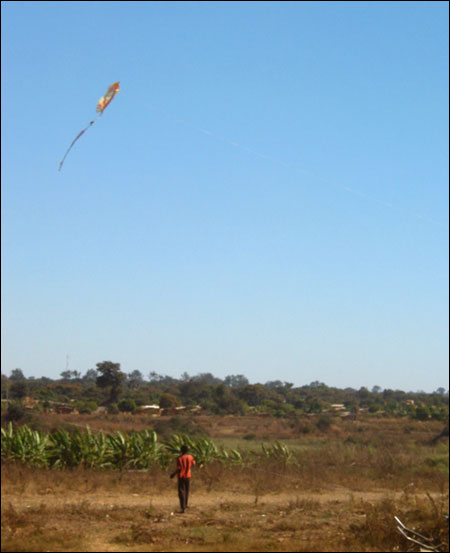
Child with kite made from plastic grocery bags
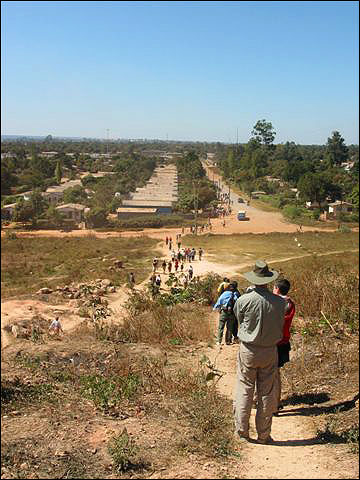
Another view of the city
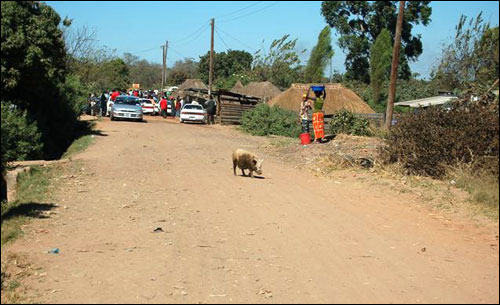
One of the many animals living freely and temporarily undisturbed in the compound
At one point in the walk we came upon two local craftsmen, sitting on the ground making clothespins from scrap lumber, using the most primitive handmade tools. Each pin was a work of art. We commissioned them to make 500 to bring back for the Bridge Walk.
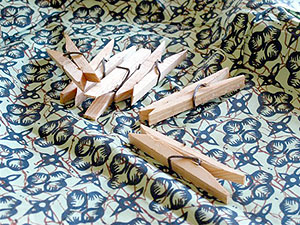
Clothes pins
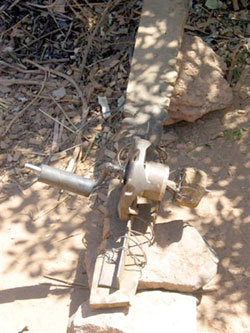
Carpentry tool
(Commercial Break for the Bridge Walk: As you may have heard (!) on Sept 23 we will gather in San Francisco for the Fifth Annual Golden Gate Bridge Walk. We are bringing back hundreds of photographs of the children the Bridge Walk fundraising will assist. Each of us walking will have a picture of one of these children clipped with a clothes pin crafted in Kantolomba to our Living Compassion Bridge Walk tee-shirt.
Towards the end of the walk Theresa pointed out a young woman, Josephine, with a baby on her back, saying that she and her baby are HIV positive and that Josephine would like to tell us her story. We soon realized that Josephine was the woman who during one of the many singing/dancing breaks in the meeting had danced with the retreatants. Part of the dance included removing the chitenge (length of native cloth used as a skirt, a shawl, or a baby carrier) she was wearing as a wrap and using it to wipe the feet of those with whom she was dancing. This was later described as a gesture of respect reserved for only the most honored guests.
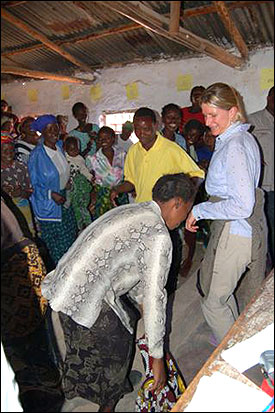
Josephine dancing
We arranged for a group—Ignatius, Theresa, the Area Councilor, Josephine and those of us from the U.S. to go back to the guesthouse and have lunch together. After lunch all the women gathered to hear Josephine’s story. She is twenty-three years old. When she was less than 2 years old her mentally ill mother disappeared and she, along with her 7 older siblings, remained with her father. While she was still in her teens her father died of tuberculosis. Josephine was sent to live with an aunt who soon tired of her presence and forced her to marry a much older man. She immediately was pregnant and gave birth to twins, one of whom died at birth, the other, Monica, is now 4 and seems to be healthy (though we saw her and thought her to be about 2 years old based on her size.)
Her second pregnancy brought Daniel, one and a half years old, HIV+, on ARVs but without proper nutrition, he is very small and weak. Her husband died of AIDS three days after Daniel was born.
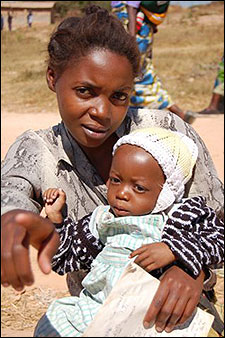
Josephine and Daniel
When her husband died his family came and took everything, leaving her and the children with only the clothes they were wearing. They now sleep on the floor of the house of one of the teachers at the new school. They have no bedding, only the one set of clothing, and no other possessions. Apparently this is a common practice. Most of the women in the community have been abandoned with nothing—and no ability to support their children. It was explained to us earlier that in poor families boys are sent to school and girls are kept home to save the school fees the girls would need. The rationale is that boys have one chance in life—an education. Girls have two chances—whatever education they have and a husband. The absurdity of that approach is made clear to us every day. The fact is that boys have one chance—an education, and girls have no chance. They are given an inferior education at best, no opportunities, and then can look forward to being abandoned or widowed with nothing. Still, everything done in the community is being done by the women, including the building of the road connecting Kantolomba to the larger community. Note: The boulders visible in the picture were part of the construction process. All were removed by the women with only hand tools.
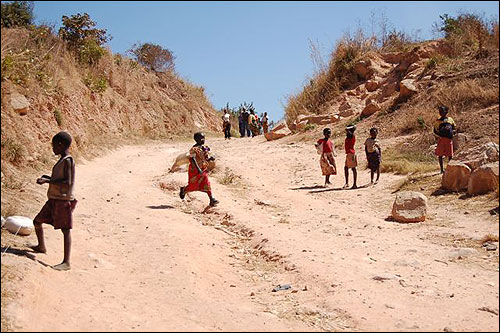
Road the women built to Kantolomba
When we’ve asked about this, about the social structure and the roles of men and women, everyone, men and women alike, make it clear that men drink and women do whatever gets done. Women raise the children, tend a garden if there is one, scrounge food, and provide for the family in all ways. For this reason those we talk to say that the changes in this culture must come through the education of women. Currently women have no rights. They do not even know how to ask for fair treatment. Mrs. Mukeya, the Area Representative, sees women’s rights as the number one priority for Africa. At one point she said, “If I continue to live, I will work tirelessly to see that these necessary changes happen for my people.” Her phrasing was sobering for all of us who do not usually keep the fragility and brevity of life in the forefront of our conscious awareness. These people simply do not assume that their life will continue beyond the immediate future.
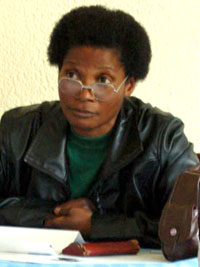
Mrs. Mukeya
We had plans for a quiet, early evening with group discussion, a simple dinner and an early bedtime, but after accomplishing the first two, life brought an alternative to our early bedtime. A man from South Africa who was staying at the guesthouse came in to the dining room just as we were finishing our meal. We welcomed his company and spent the next couple of hours learning what it was like to grow up as a white South African (fifth generation) in a racist culture, in a racist family, and to be transformed through fighting a war that he grew to see as cruel and wrong. He spoke eloquently of learning to admire and respect a people he had been conditioned to despise. His love for Africa, for her people, and his hope for the future were inspiring.
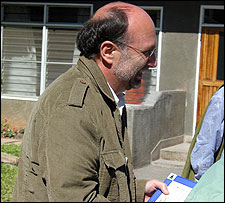
Our South African friend
Tomorrow: Church and an outing with the Kapenda family.
